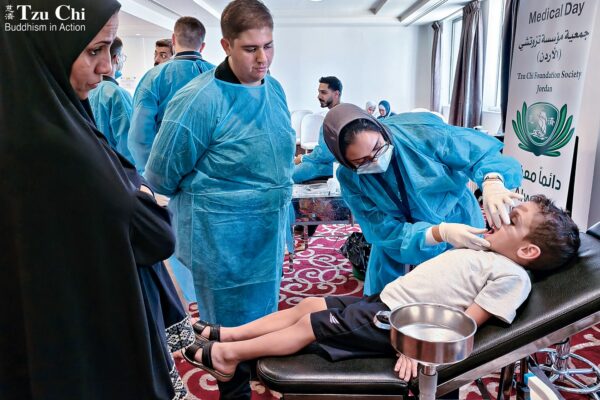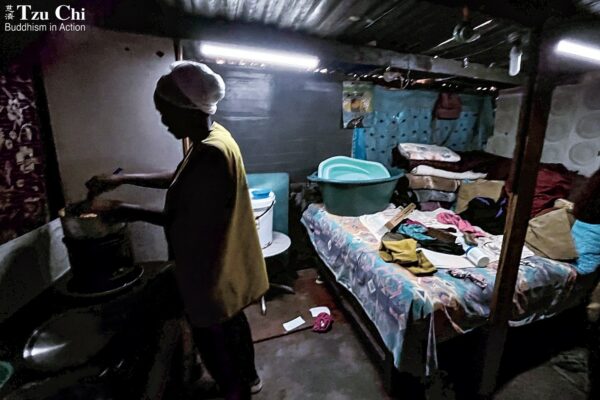By Wang Wei-ling
Translated by Wu Hsiao-ting
Photos courtesy of Tzu Chi volunteers in Poland
The Dumpling Club at Tzu Chi’s Warsaw office provides a warm and enjoyable experience for older Ukrainian refugees.
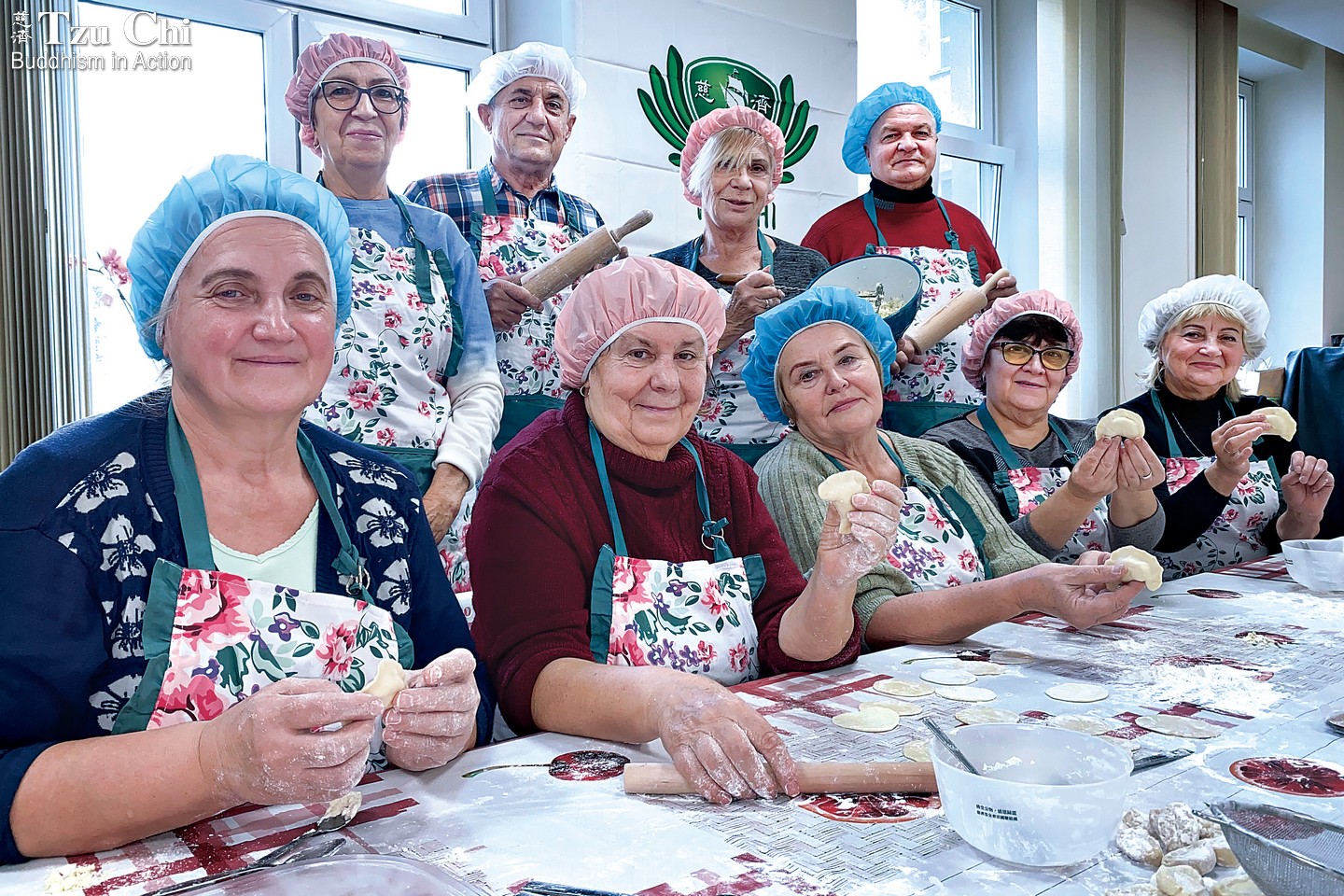
Senior Ukrainians gather at Tzu Chi’s Warsaw office every week for the Dumpling Club, where they prepare traditional Ukrainian dumplings. The proceeds from 80 percent of the dumplings made at the club go to the participants, while the remaining 20 percent is donated to their fellow refugees struggling to cope in Warsaw.
In a kitchen in Warsaw, Poland, a pot of sour cherries and sugar simmered gently on the stove, gradually transforming into a beautiful crimson-purple jam. The sunlight streaming in through the window was just perfect, the bright beams of light illuminating airborne flour particles and making them glimmer like grains of golden sand. Laughter echoed through the air, which also carried a tangy, sweet, and comforting aroma.
The kitchen was located in the Tzu Chi Warsaw office, where more than a dozen elderly Ukrainians, refugees from their war-torn homeland, had gathered around a long wooden table. Their hands, bearing the marks of time, expertly divided fermented dough into small balls and rolled them into thin, round wrappers. As they waited for the cherry jam to be ready for use as a dumpling filling, they shared their cherished family recipes for varenyky, traditional Ukrainian dumplings.
Hanna Mankus, a Ukrainian working for Tzu Chi in Warsaw, observed, “When these seniors come to the Dumpling Club, they become like kindergarteners, competing to see whose dumpling recipe is the best! Witnessing them cast aside their worries and radiate such cheerfulness has been a delightful surprise that I didn’t foresee when I first proposed the Dumpling Club project.”
Mankus understood the seniors’ pride as they shared their family recipes. She also understood the solace they found in participating in the club. As they filled the dumpling wrappers with ingredients, skillfully folding and pinching them into plump half-moons, they were momentarily transported back to the kitchens of their beloved homes in Ukraine. There, they had lovingly prepared the most delicious dumplings, both savory and sweet, in response to the charming requests of their grandchildren.
“After the war broke out, life became exceptionally tough for the elderly. They grappled with language barriers in a foreign land and were often burdened by health issues,” Mankus explained, her empathy deep for the seniors who were uprooted in their old age and forced to seek refuge in a foreign land. She highlighted one of their challenges: “Back in Ukraine, getting medical care was much easier; a simple phone call could secure you an appointment for the next day. But here, it could take six months to a year to see a specialist. They also struggle to communicate with healthcare providers.” Getting around was also problematic; even understanding bus stop signs posed a challenge. “Sometimes, even I myself feel like I’m from Mars,” she added.
Staying in Poland for an extended period became their new reality, but everything felt so unfamiliar. They had to start anew. Even stepping beyond the doors of their rooms in their host families’ homes became intimidating for these older individuals.
Nina Kravchenko, an elderly Ukrainian refugee, expressed her concerns: “I’m not sure if my Polish host family enjoys having me in their home or if I’m inconveniencing them. I worry that they might ask me to leave one day.”
Fear, anxiety, and loneliness weighed heavily on the seniors, leaving them increasingly despondent. To offer support, Mankus proposed the idea of establishing a dumpling club in late September 2022. Older Ukrainians were invited to gather at the Tzu Chi Warsaw office every Friday to make dumplings together.
“Ukrainians have a natural talent for making dumplings,” Mankus declared, “but the question was whether the elderly would be willing to leave their homes to participate in our club. Some initially had doubts, but I didn’t let them stop me.” She rallied help, organized purchases, prepared ingredients, and sent out invitations. “In the beginning, we had just seven elderly participants, but as of June this year, we’ve conducted over 30 sessions, and now 16 seniors regularly attend. They are fondly called the ‘Dumplingists.’” These Dumplingists eagerly anticipate their Friday gatherings and have even started meeting in a park for walks and chats.
Eighty percent of the dumplings made at the club are available for purchase. “We offer dumplings with a cabbage filling, paired with fried cheese, fried onions and mushrooms, or mashed potatoes,” Mankus explained. “We also have fruit jam options, with sour cherries being our unique specialty! Most Poles haven’t tasted these delights before, and those who purchased them were pleasantly surprised, with many showing their support by regularly buying the dumplings.” The proceeds from these sales are distributed among the elderly participants. Although the amounts may not be substantial, the seniors receive a sense of accomplishment as they earn money through their own culinary skills.
The remaining 20 percent of dumplings are donated to Tzu Chi’s long-term care recipients in Warsaw, who are financially strapped refugees unable to work due to various circumstances. “When we deliver the dumplings to these families,” said Mankus, “we always take pictures and show them to the Dumplingists upon our return. The seniors are deeply gratified, knowing that their presence still carries great meaning and that they can bring joy to others.”
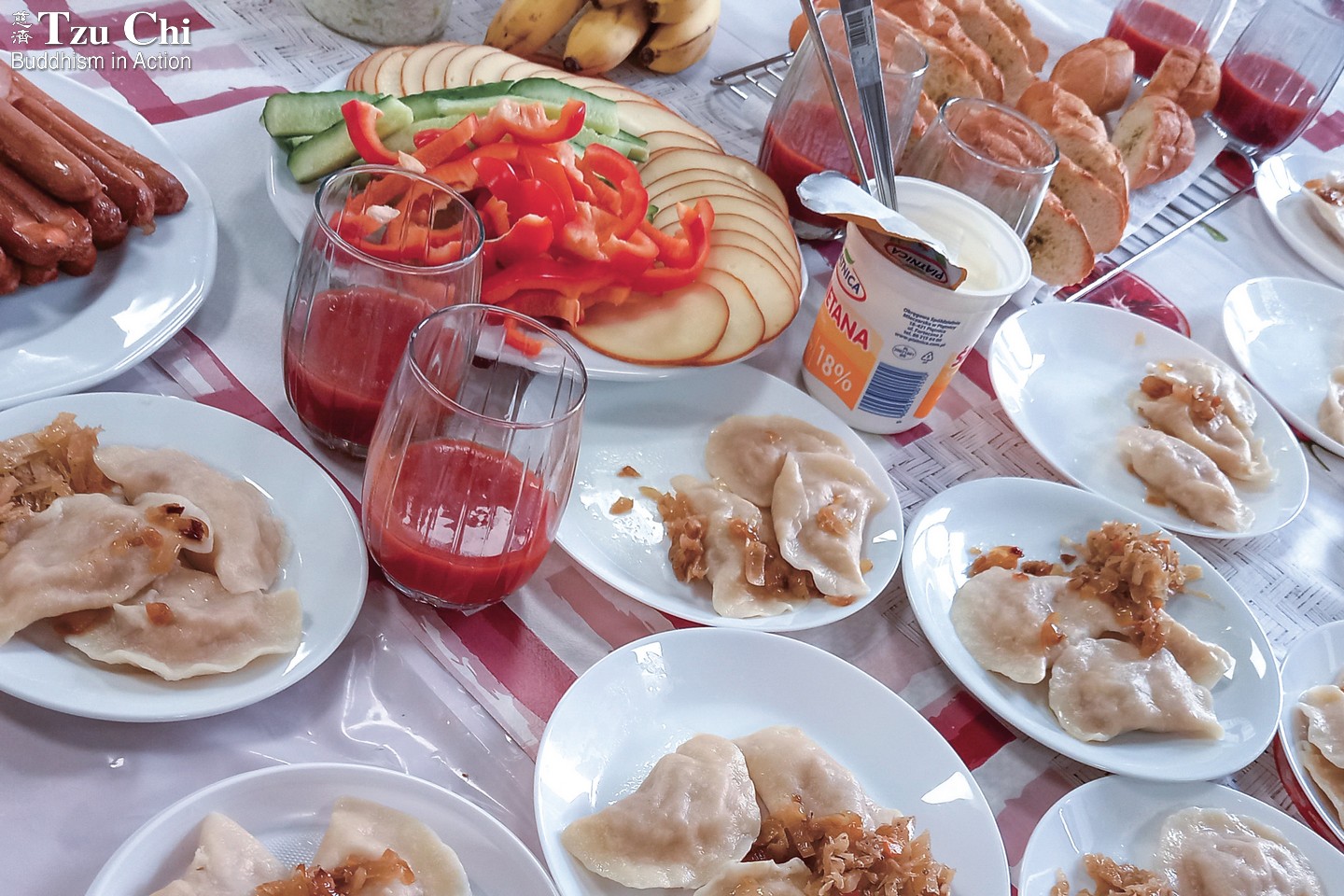
Ukrainian dumplings are traditionally served with fried onions and sour cream. At the Dumpling Club, all the food is vegetarian.
1.4 million displaced people
Mankus vividly recalled the harrowing experience of fleeing her homeland after the Russian invasion: “I boarded a train with my children. Our compartment was packed with 18 people, standing or sitting. We passed through areas where Russian forces were bombing, and the sky turned red. We were terrified, thinking about running out, but where could we escape to? We could only huddle together, hands shielding our heads, and hope for the best.”
Mankus had been an English teacher in Ukraine. After evacuating from Zaporizhzhia in southeastern Ukraine and arriving in Warsaw, she discovered that Tzu Chi was recruiting Ukrainian refugees who could speak English to assist with translating for the foundation’s relief efforts for displaced Ukrainians. That’s how she joined Tzu Chi, becoming a participant of their work relief program.
Over the past year, she has been assisting Tzu Chi in organizing English language courses and training more Ukrainians to speak English for the foundation’s medium- and long-term refugee services. “Initially, we thought this war would only last a few weeks,” she said, “and then we would be able to return home, but that did not happen. I’m very grateful to Tzu Chi for providing employment opportunities through their work relief program, which has empowered me to establish a life here in Poland.”
Nevertheless, not every refugee has been able to secure employment. According to Polish government statistics from March of this year, approximately 1.4 million Ukrainian refugees have opted to stay in Poland. A survey conducted by the Norwegian Refugee Council revealed that up to 70 percent of Ukrainian refugees in foreign lands, primarily women with children, are on the brink of poverty, struggling to meet even their most basic living expenses.
Susan Chen (陳樹微), a Tzu Chi volunteer from Germany, has visited Poland several times since the outbreak of the war to support Tzu Chi in its relief efforts for Ukrainian refugees. She pointed out that many non-profit organizations have pulled out of Poland, exacerbating the challenges faced by refugees. Moreover, the cost of essential goods and utilities has risen significantly this year. The Polish government alone cannot adequately care for all the refugees. “War is incredibly cruel, especially for innocent people,” Chen remarked. “Our presence here is not only to provide aid but also to ensure that victims of the war do not harbor hatred. We want them to realize that amidst the brutality of conflict, there are people who genuinely care about their well-being.”
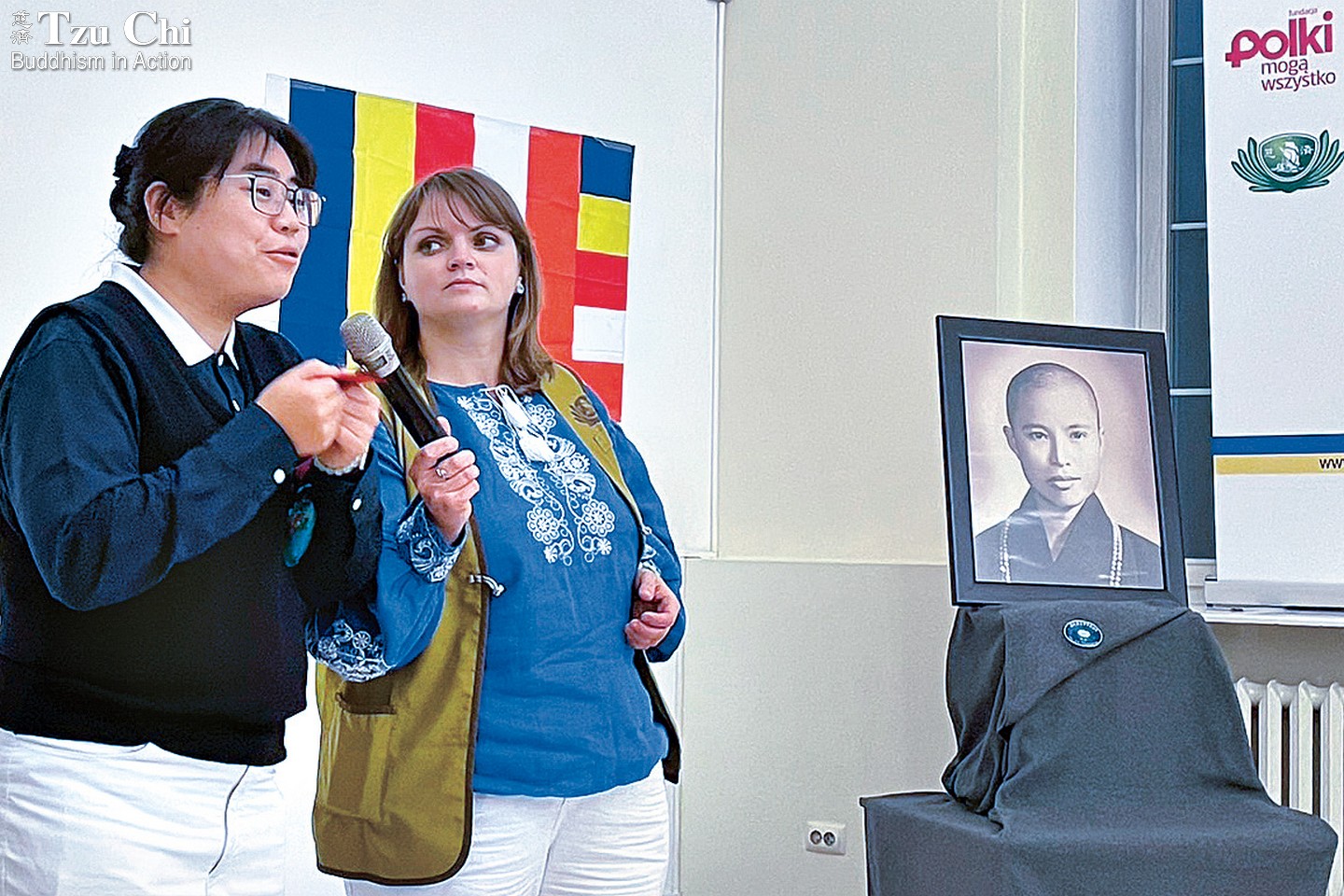
Hanna Mankus (second from left) serves as an interpreter in a Tzu Chi event, working alongside Tzu Chi volunteers to help her fellow Ukrainians.
Courtesy of Nadya Chou
Away from home for over 400 days
On the first anniversary of the war, Mankus returned to her hometown of Zaporizhzhia for a visit. Located not far from the heavily bombed cities of Mariupol and Donetsk, Zaporizhzhia had become a refuge for many who fled those areas. As Mankus set foot on the streets of her hometown, she didn’t experience the excitement she had anticipated; instead, she felt disoriented. Everything had become so unfamiliar. All the windows in the buildings were vacant, and the air was filled with the scent of war. Even though it was daytime, the streets were deserted, and children were nowhere to be seen. “My home had temporarily become a shelter for displaced people from other cities, and the furniture had been rearranged. Naturally, I was okay with it,” she said.
After a short stay of just a few days, Mankus returned to Poland, deciding to stay in Warsaw for the safety and education of her children. When asked what she missed most about Ukraine, she took a moment to reflect before responding in earnest, “What I miss the most is actually the simple routine of waking up every morning, walking over to the refrigerator, seeing what’s inside, and thinking about what kind of breakfast to prepare. I really miss making my own sunny-side-up eggs.”
Mankus and her children currently live in a Catholic monastery in partnership with Tzu Chi, where their three daily meals are provided by the monastery. She expresses her gratitude to all the organizations that have generously provided assistance but can’t help but yearn for the days of her former independence. Still, she says, “If I have a message for my fellow countrymen, it is this: I hope that this war will make us all better, not worse.”
Families and elderly individuals receiving Tzu Chi’s care in Warsaw all participate in charitable activities alongside volunteers. This includes the production of dried fruit to be sent to underserved Ukrainian war zones for the elderly, vulnerable individuals, women, and children who are unable to leave. “In a well-known Ukrainian cartoon, there’s a saying, ‘The way your ship sails depends on how you name it,’” said Mankus. “So, I don’t consider myself a refugee; I see myself as a volunteer.”
In the kitchen of the Tzu Chi Warsaw office, participants of the Dumpling Club scooped dumplings ready to eat out of pots of boiling water. They brushed them with butter or topped them with fried onions before preparing to enjoy them with sour cream—this is the authentic way to savor Ukrainian dumplings. Everyone cheerfully dove in, finding comfort and strength in this traditional dish from their homeland.
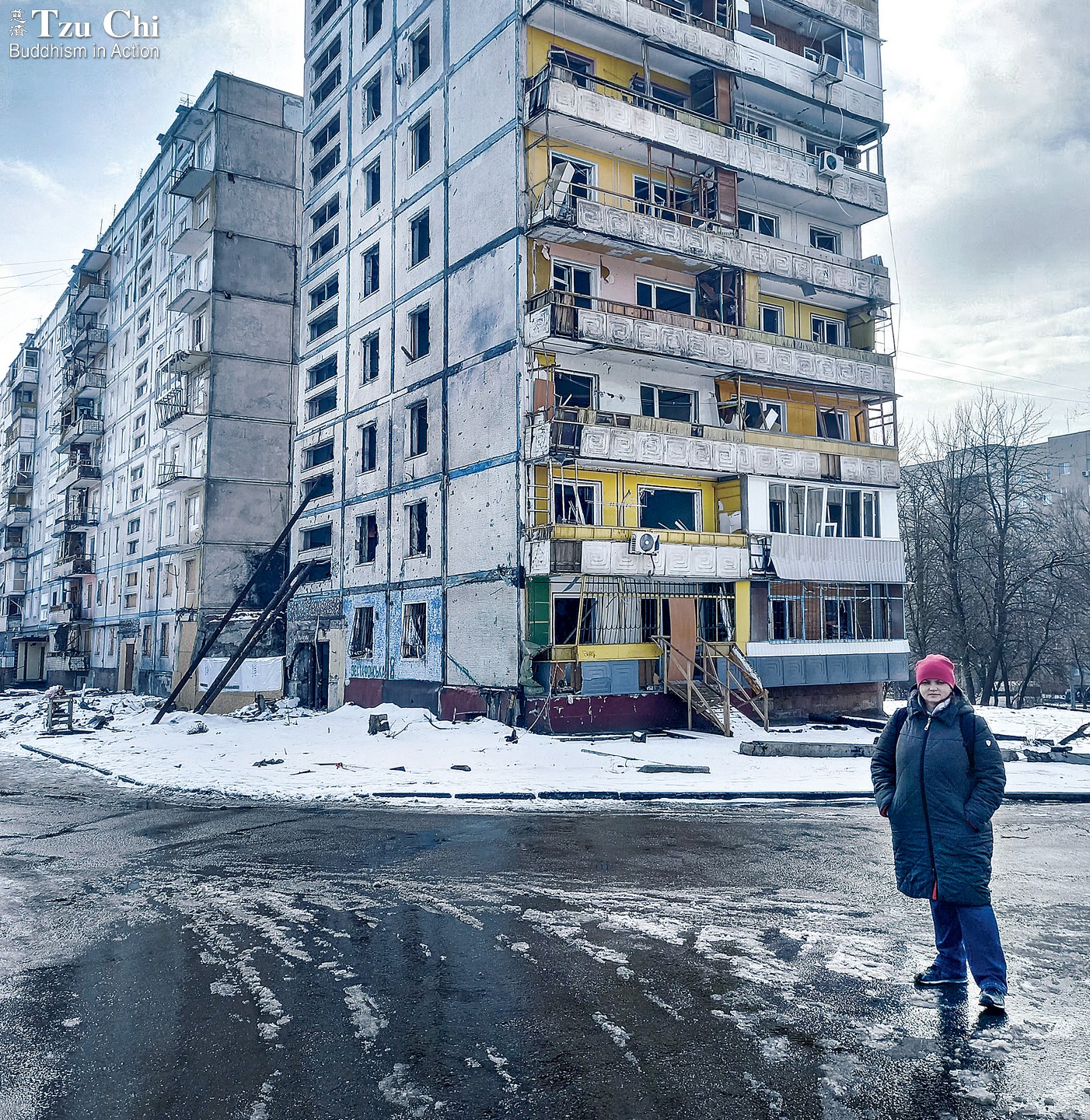
Hanna Mankus returned to her hometown of Zaporizhzhia, Ukraine, in early February this year. The streets were empty and the windows of buildings were either empty or boarded up.
Courtesy of Hanna Mankus


